US and Canada partner to invest $21 million for environmental and occupational health research hubs in developing countries
November / December 2015 | Volume 14, Issue 6
Pesticide use, household and outdoor air pollution, mining hazards and other occupational and environmental risk factors cause almost a quarter of the world's deaths, according to the WHO. The greatest burden of disease caused by these exposures occurs in low- and middle-income countries (LMICs), where there is limited capacity to study the links between these risk factors and illness. Meanwhile, more than two million workers around the world die every year due to occupational injury or illness, costing the global economy billions of dollars, as reported by the International Labour Organization.
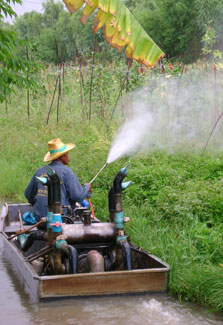
Photo courtesy of Mahidol-UMass Lowell
Center for Work, Environment, Nutrition and
Human Development
GEOHealth Hubs will support research on
pesticide use, household and outdoor air
pollution, mining hazards and other
occupational and environmental risk factors.
To address these critical problems, the U.S. and Canada are partnering to invest $20.9 million dollars over five years to establish seven regional research and training centers, called Global Environmental and Occupational Health (GEOHealth) Hubs. Each hub will be based in an LMIC and consist of a multidisciplinary group of researchers and partner organizations who will collaborate on common research and training topics that address environmental and/or occupational health issues.
Hubs are supported by two linked awards - one to an LMIC lead institution for research on key topics of regional importance and another to a U.S. institution to oversee relevant research training. The hubs are intended to become internationally recognized centers for the collection, management, synthesis and interpretation of data on environmental and occupational health.
Together, the seven hubs will form the GEOHealth Network, a platform to build LMIC research leadership in environmental and occupational health, and foster the exchange of knowledge and use of evidence to inform policies.
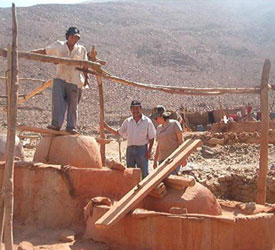
Photo courtesy of Emory University
GEOHealth Hubs will research mining hazards, including
those caused by informal gold mining, shown above, in
Peru.
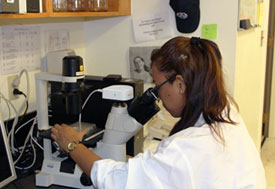
Photo courtesy of Tulane University School
of Public Health and Tropical Medicine
GEOHealth Hubs will also train researchers in skills
that address environmental and occupational health
issues.
Fogarty is coordinating and partially funding the awards, in collaboration with NIH partners - the National Cancer Institute (NCI) and National Institute of Environmental Health Sciences (NIEHS). Also providing support is the National Institute for Occupational Safety and Health (NIOSH), part of the Centers for Disease Control and Prevention (CDC). Canada's International Development Research Centre (IDRC) is contributing to the funding of research led by LMIC scientists. The Global Alliance for Clean Cookstoves is also participating in the GEOHealth program by offering supplemental funding for research and training focused on household air pollution.
“We know that air and water pollution, pesticide exposure, climate change and other environmental and occupational risk factors contribute to the growing burden of noncommunicable diseases in LMICs,” said Fogarty Director Dr. Roger I. Glass. “These research hubs are designed to develop a critical mass of scientists who can discover how these exposures trigger diseases, identify effective interventions and spur policy changes that will improve health.”
The overall goals of the GEOHealth Hubs are to strengthen environmental and occupational health-related research collaborations, accelerate scientific infrastructure development, enhance research training, create relevant advanced educational curricula and outreach material, support research needed to address environmental and/or occupational exposures, and inform nationally relevant policy development in LMICs.
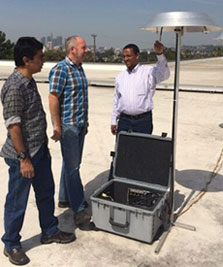
Photo courtesy of the University of
Southern California
Researchers with the Ethiopian GEOHealth
Hub, shown here monitoring air quality, will
study air pollution, climate change and
occupational health throughout eastern Africa.
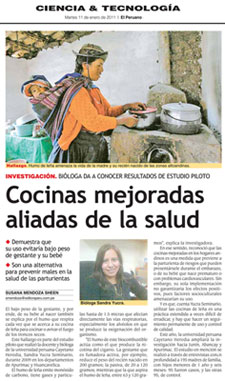
Image of article courtesy of Emory University
An article in El Peruano covers research on
the connection between indoor air pollution
and birthweight in the highlands of Peru,
conducted by scientists who will participate in
the GEOHealth Hub based in that country.
Neurotoxins related to mining and agricultural development and their impact on maternal and child health throughout the Caribbean will be examined from a hub based in Suriname. Meanwhile, scientists at a center in Thailand will investigate pesticides commonly used in agriculture across Southeast Asia, to see if they act as endocrine disrupters, increasing the risk of metabolic syndrome and associated diseases such as diabetes, stroke and heart disease.
A hub in India will focus on air pollution and developing the scientific expertise to study the unique characteristics of exposures in that country, while a center in Bangladesh will address household air pollution, climate change and the garment worker industry. Another hub, in Peru, aims to build scientific capacity and support research on air pollution and climate change, with links to the neighboring countries of Ecuador, Bolivia and Chile.
A hub based in Ethiopia will develop spokes in Kenya, Rwanda and Uganda to study air pollution, climate change and occupational health related to temperature. Finally, research and training in West Africa will focus on health threats from electronic waste, gold mining and transportation-related ambient air pollution, led from a center in Ghana.

